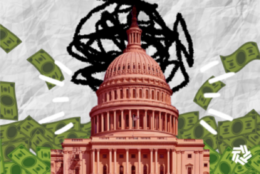accountability
-
Does the federal government hold members of the Senior Executive Service accountable for their actions? In part three of Federal News Radio's special report, Fixing the SES, current and former senior executives respond candidly to the criticism.
February 23, 2015 -
Fewer than half of the Senior Executive Service members who responded to an exclusive Federal News Radio online survey say they would join today. The survey results were even more dim for federal employees at the GS-15 and GS-14 ranks. In the first of our four-part special report, Fixing the SES, we examine how current senior execs feel about the SES, and what they believe is right and wrong with the service.
February 09, 2015 -
House Veterans Affairs Committee Chairman Jeff Miller wants new ways to punish SES members accused of misconduct, including possible pension reductions, limits on paid leave. He also wants to curtail VA's bonus award system.
January 23, 2015 -
The Energy secretary is shaking up the department to improve accountability. Project managers will assume more responsibility and face harsher consequences if they fail to meet major targets. Some contractors already have felt the difference, and it isn't pretty.
January 16, 2015 -
An amendment to the Freedom of Information Act appeared to sail through the Senate. The goal is to hold agencies more accountable for disclosing records and create a more uniform system for the public to file FOIA requests. The Senate Judiciary Committee passed the bill unanimously. Sean Vitka, federal policy manager at the Sunlight Foundation, joined Tom Temin on the Federal Drive with analysis of what the bill would do.
November 25, 2014 -
Despite the billions spent investing in systems, financial processes are such that when you add up all the layers, it takes something akin to archaeology for a citizen to unearth a specific fact about where and how money was spent, says Federal News Radio host Tom Temin.
March 04, 2014 -
Walter Shaub Jr. said the STOCK Act could cause unintended consequences for federal employees' privacy and safety. Shaub said he favors revisions aimed at striking a balance between the need to protect personal information and the law's requirement to disclose stock trades.
July 23, 2012 -
While the Internet is a key priority for federal agencies to create economic prosperity, various rules set by regulatory agencies are hindering the fast-pace growth on the Web.
July 12, 2012 -
The websites for the Fiddlin\' Foresters - the official U.S. Forest folk band - and one for desert tortoises are a couple of websites that could be on the chopping block in the White House efforts to cut wasteful spending.
June 14, 2011 -
Jim Dyer, CFO at the Nuclear Regulatory Commission, explains how the commission has taken to hear the President\'s priority of performance reporting.
May 26, 2011 -
Greg Kutz, the Managing Director of GAO\'s Forensic Audits and Special Investigations team, explained how contractors were evaluated for the report.
May 26, 2011 -
Ken Donohue is a principal at the Reznick Group, and former Inspector General at HUD. He talks about who did what to get that number down so low.
May 02, 2011 -
Some people think the agencies are \"measured enough\"and some think your agency is overmeasured.
April 27, 2011 -
Congressional auditors are recommending some changes to the way treasury manages the Troubled Asset Relief Program (TARP).
April 21, 2011 -
The IG says the Defense Department didn\'t follow specific rules to make sure the information was correct.
March 29, 2011





